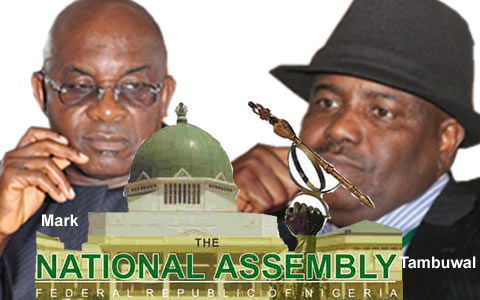The refusal of President Goodluck Jonathan to sign the 2013 budget due to alterations by the National Assembly is causing tension to brew among the lawmakers.
When in times past, such situations caused the legislature to confront the executive over rejecting the budget, the present set of legislators and its leadership are reluctant to challenge the President as they feel guilty for inflating the budget.
The initial budget proposal sent to the National Assembly for approval by the President amounted to N4.25trillion, but the lawmakers padded it with N63 billion to bring the final figure to N4.98 trillion.
This infuriated President Jonathan who has since distanced himself from the document and returned it to the National Assembly to remove the extraneous items smuggled into it and to reconsider the zero allocation to the Securities and Exchange Commission, SEC, and the $79 oil benchmark it predicated the document on.
Sources also told our correspondent that prior to this, there was tension among the lawmakers over how the huge addition was smuggled into budget by a few privileged members without the knowledge of the majority.
Members are upset that only a handful of key officials sat, chose and picked choice projects worth billions for their respective constituencies and thereafter allotted marginal or inconsequential projects for the generality of members in their bid to give the impression that all members were carried along in the nebulous exercise.
They are also concerned that the rejection of the budget by the President would only add to the suffering of Nigerians, as they accused the leadership of the National Assembly of greed and nepotism by putting their immediate constituencies first instead of the overall interest of Nigerians.
An aggrieved female member from one of the South-East states noted that the leadership had been meeting quietly on how to resolve the budget impasse because of the ignoble roles played by key officials.
It is also learnt that a principal officer in one of the two chambers of the National Assembly is in trouble with other lawmakers following the discovery that he singlehandedly cornered projects to the tune of N3 billion for his constituency.
Contrastingly, ordinary members of both chambers were asked to choose projects not exceeding N50 million for their constituencies to be included in the padded budget.
Another source in the NASS said, “Our colleagues are murmuring over the return of the budget by the President to the National Assembly but it is unfortunate that our leadership cannot speak against the matter because they soiled their hands in the budget.
“Our anger stems from the fact that an erroneous impression has been given by the leadership that all members of the NASS were involved in the budget padding whereas most members do not know anything about it.
“We believe that they have been silenced by the Presidency because of their established interest. They should sum up courage to challenge the President if their hands are clean,” a member said.
However, a member of the House of Representatives from Borno State, Kaka Kyari Gujbawu, has warned that the budget row should be resolved as soon as possible in the interest of the nation.
Gujbawu, who is a member of the PDP Renaissance Group, made it clear that any undue delay in assenting to the bill could further damage the nation’s fragile economy.
The lawmaker said, “The advice I want to give to my colleagues in the National Assembly and the executive about the budget is that they should place the interest of the country above personal interest.”

